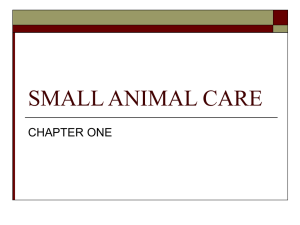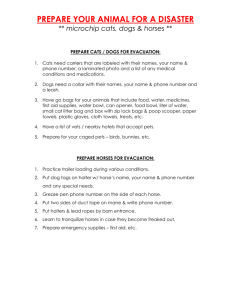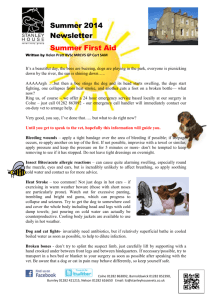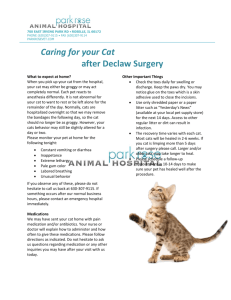Sharing is not always caring: Parasites like hookworms and
advertisement
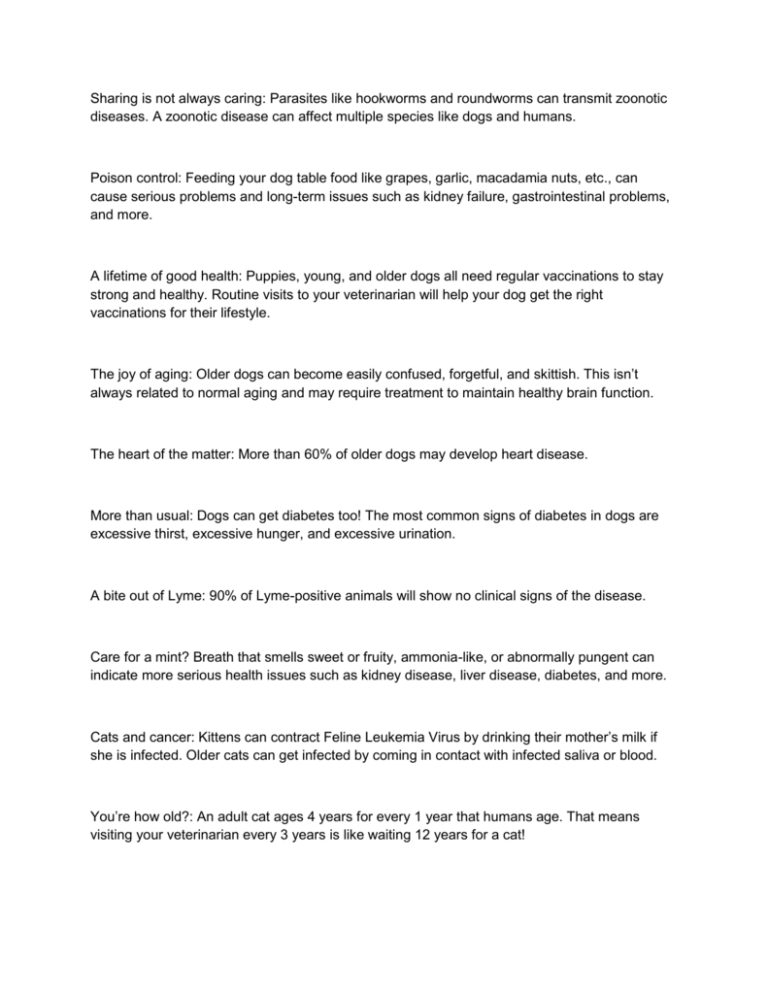
Sharing is not always caring: Parasites like hookworms and roundworms can transmit zoonotic diseases. A zoonotic disease can affect multiple species like dogs and humans. Poison control: Feeding your dog table food like grapes, garlic, macadamia nuts, etc., can cause serious problems and long-term issues such as kidney failure, gastrointestinal problems, and more. A lifetime of good health: Puppies, young, and older dogs all need regular vaccinations to stay strong and healthy. Routine visits to your veterinarian will help your dog get the right vaccinations for their lifestyle. The joy of aging: Older dogs can become easily confused, forgetful, and skittish. This isn’t always related to normal aging and may require treatment to maintain healthy brain function. The heart of the matter: More than 60% of older dogs may develop heart disease. More than usual: Dogs can get diabetes too! The most common signs of diabetes in dogs are excessive thirst, excessive hunger, and excessive urination. A bite out of Lyme: 90% of Lyme-positive animals will show no clinical signs of the disease. Care for a mint? Breath that smells sweet or fruity, ammonia-like, or abnormally pungent can indicate more serious health issues such as kidney disease, liver disease, diabetes, and more. Cats and cancer: Kittens can contract Feline Leukemia Virus by drinking their mother’s milk if she is infected. Older cats can get infected by coming in contact with infected saliva or blood. You’re how old?: An adult cat ages 4 years for every 1 year that humans age. That means visiting your veterinarian every 3 years is like waiting 12 years for a cat! Don’t forget about the cat: Many people don’t realize that cats can get heartworm disease too! Pearly whites: Healthy teeth and gums are more important than you think. Dental issues can signal that your cat has a serious chronic issue like kidney disease. Home sweet home: According to a study, 41% of people looking for their lost cat considered him or her an indoor pet. A microchip acts as a cat’s permanent ID and can help identify its owner in the event that he or she is found an scanned at a clinic or shelter. It’s good to be a cat: Both diabetic dogs and cats will suffer from excessive thirst, excessive hunger, and excessive urinating but, unlike dogs, some diabetic cats are able to go into remission with proper diet and therapy. No sense in waiting: There are no medical benefits of letting a cat have her first heat or litter before being spayed. In fact, spaying your cat early can help make the operation easier to complete as well as decrease a cat’s desire to mark her territory. Indoor dangers: Even indoor cats need regular vaccinations to stay healthy. Nasty parasites can enter your home and transmit disease. And some indoor cats may get loose in the yard long enough to get infected. Keep your pet away from antifreeze: Antifreeze is extremely poisonous and can cause severe damage if your pet ingests it. Clean up any leaks or spills with products containing propylene glycol to keep your pet from getting sick. Never leave your dog or cat in the car: Vehicles can become extremely cold during the winter. Make sure your dog or cat isn’t left alone in the car or they could risk freezing to death. Give your pets supplements: Vitamins can provide essential nutrients that can help protect your pet inside and out. Contact us to see what vitamins we recommend for your pet during these winter months. Keep your dogs on a leash: A dog’s sense of smell can be hindered in freezing temperatures; this is one of the reasons why more dogs get lost during the winter than any other season. Always keep your dog on a leash, make sure he/she is wearing a tag, and has been microchipped. Winter fashion is all the rage: Sweaters, jackets, and booties can be both adorable and essential to keeping your pet warm. Some breeds are unable to grow a long, thick coat, so a warm winter vest may be necessary to keep their body heat in and the cold out. Bring your pets indoors: Dogs and cats that enjoy the freedom of the great outdoors may not love the idea of being cooped up inside, but a warm living room can provide safety from freezing temperatures, disease, and other animals looking for a fight over food or a place to stay warm. Wipe off your pet after playing: Other than cold toes and a wet belly, snow can cause more serious issues. As dogs or cats clean themselves, they can ingest salt, antifreeze, and other harsh chemicals. Snow or ice can also get stuck between their paws, potentially causing them to bleed. Watch out for sleeping cats: Some outdoor cats may try to find a nice dry spot to take a nap. Unfortunately, some cats may climb under the hoods of cars in order to find shelter from the cold. Before starting the engine, bang on the hood a few times to wake up any sleeping cats and give them a chance to move. Care for your pet’s skin: Like humans, dogs and cats can get dry skin during the winter months. Certain gels and creams can help keep your pet’s paws, ears, and nose moisturized and prevent painful cracking. Ask us what products we recommend for your pet’s skin. Fact: Osteoarthritis in dogs can range from mild stiffness to complete lameness. Talk to us to learn more. Fact: Some houseplants can be hazardous to your cat’s health. Talk to us to learn more. Fact: 20% of spayed female dogs may develop urinary incontinence. Talk to us to learn more. Fact: A microchip can be inserted via one fairly painless injection and identifies a pet for its entire life. Talk to us to learn more. Fact: More than 60% of older dogs may develop heart disease. Talk to us to learn more. Fact: Veterinary hospitals depend on blood donations for pets. Talk to us to learn how you can help. Fact: On average, preventative care costs less in the long term than treating acute disease. Talk to us about scheduling regular checkups. Fact: 1 in 3 pets will get lost in its lifetime. Talk to us to learn how to protect your pet.
